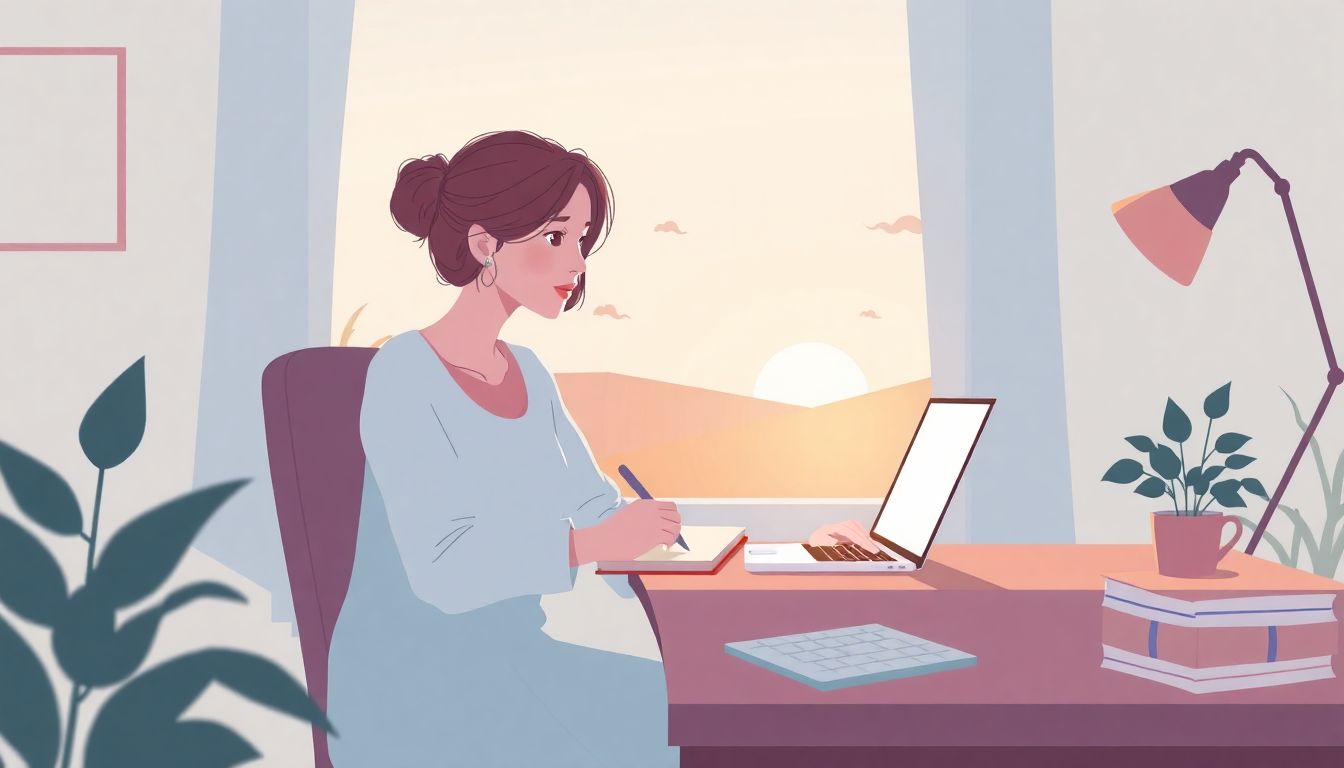Many poets struggle with creative blocks that can feel insurmountable. Whether it’s staring at a blank page or feeling uninspired by the world around you, these hurdles can be frustrating—trust me, we’ve all been there! It can often seem like the muse took a vacation without you.
But what if I told you there’s a handy helper in your corner? If you stick with me, I’ll share how ChatGPT can reignite your creativity and help you break through those pesky barriers. You’ll discover techniques that can transform your poetic process into something vibrant and exciting.
From generating fresh ideas to refining your verses, we’ll explore how this AI tool can be your trusty sidekick in crafting poetry. Get ready to unleash your inner bard with the power of ChatGPT!
Key Takeaways
- ChatGPT can help poets overcome creative blocks by providing fresh ideas and perspectives.
- Identify your specific creative hurdle and use tailored prompts to guide the AI for effective support.
- Common blocks include fear of judgment, perfectionism, and lack of inspiration; address these with unconventional prompts.
- Effective prompts can help generate unique poetry ideas and push your creativity further.
- Use ChatGPT for feedback and to restructure your poems, making them clearer and more engaging.
- Consistent daily writing with ChatGPT prompts can help build and maintain your poetry practice.

How to Use ChatGPT to Overcome Creative Hurdles in Poetry
Using ChatGPT can help you tackle those pesky creative hurdles in poetry.
Whether you’re stuck on a stanza or just can’t find the right words, this AI tool can offer fresh perspectives and ideas.
Start by clearly identifying your specific hurdle.
Are you facing writer’s block, struggling with theme development, or seeking inspiration for character voice?
Once you clarify your challenge, you can use tailored prompts to guide ChatGPT into providing the support you need.
For example, if you’re struggling with writer’s block, try using this prompt: “Generate a list of 10 emotions I can explore in a poem.”
This simple step can open up new avenues for inspiration, allowing your creativity to flow more freely.
Common Creative Blocks Poets Face
Every poet faces creative blocks at some point, and understanding these can be the first step toward overcoming them.
Types of creative blocks include fear of judgment, perfectionism, and sometimes just a lack of inspiration.
Another common hurdle is getting stuck on ideas that seem too trivial or cliché.
To combat these obstacles, consider using prompts that push you out of your comfort zone.
For instance, prompt ChatGPT with: “List 5 unconventional topics I can write a poem about.”
This can help shift your perspective and spark new creative thoughts.
Moreover, having a routine or a regular writing practice can help reduce the frequency and impact of these blocks.
Effective ChatGPT Prompts for Generating Poetry Ideas
If you’re looking to generate fresh poetry ideas, ChatGPT can be your brainstorming buddy.
Use specific and creative prompts to get the best results.
Here are some effective prompts you can try:
- “Write a haiku about a sunny day in spring.”
- “Create a list of 10 verbs associated with water for a poem.”
- “Suggest three contrasting images that I can use in a poem.”
- “Help me brainstorm three different perspectives on love for a romantic poem.”
- “Generate a metaphor for time that I can use in my writing.”
These prompts are designed to spark creativity and can lead you down interesting paths in your writing journey.
Don’t hesitate to experiment with different variations of prompts to see what resonates best with you.
How to Revitalize Your Poetry with ChatGPT’s Help
If your poetry feels stagnant, ChatGPT might just be the revitalizing force you need.
Start by sharing your current poem or theme with the AI, asking for suggestions on how to enhance it.
For instance, you can ask: “What are some ways to add depth to my poem about loss?”
ChatGPT can suggest thematic elements, imagery, or even different structures to consider.
Additionally, you can use prompts like: “Rewrite my poem in a different style or form.”
This not only gives your work a fresh twist but can also introduce you to styles you might not have considered.
Finally, don’t forget to request specific feedback on your drafts.
Ask ChatGPT: “What emotion does this poem convey?” to get insights that might refine your artistic expression.

Using ChatGPT for Finding Inspiration in Nature
Finding inspiration in nature can breathe new life into your poetry, and ChatGPT can help you tap into that wellspring of creativity.
Start by asking ChatGPT to describe different natural settings or phenomena.
For example, try this prompt: “Generate a list of five natural landscapes to inspire a poem.”
This can provide you with vivid imagery and a sense of place to weave into your writing.
You can also focus on specific elements of nature that resonate with you.
Use prompts like: “List 10 sensory details I can include in a poem about the ocean.”
These details can help paint a picture that transports your readers.
Don’t forget to explore themes like change and growth.
Ask ChatGPT: “What metaphors can I use to connect nature’s cycles to human experiences?”
This will enable you to articulate deeper emotions through the lens of the natural world.
Creating Unique Characters and Voices with ChatGPT
Characters and voices are crucial in poetry, and ChatGPT can assist in developing them effectively.
To get started, you might want to prompt ChatGPT with: “Generate a brief character sketch for a lonely poet living in a bustling city.”
This sketch can serve as a foundation for your poem and help you understand their motivations.
Experiment with voices by asking ChatGPT: “Write a stanza in the voice of a child discovering a hidden garden.”
Shifting perspectives can add layers to your work, making it more engaging for readers.
You can also explore various character archetypes by using prompts like: “List five archetypes representative of love in poetry.”
Incorporating diverse voices leads to richer narratives and enhances emotional depth.
Finally, consider collaborating with ChatGPT to explore dialogue.
Try this prompt: “Create a conversation between two characters discussing their views on nature.”
This exercise can provide insights into their personalities and relationship dynamics.
Collaborating with ChatGPT to Edit and Improve Your Poems
Editing can be a daunting part of the writing process, but collaborating with ChatGPT can simplify it.
Start by pasting your draft into the chat and asking for feedback.
A useful prompt might be: “What suggestions do you have to improve the flow of this poem?”
ChatGPT can help identify areas where clarity or style could be enhanced.
For a more detailed review, try: “Identify any clichés in my poem and suggest alternatives.”
Removing clichés can make your work feel fresh and original.
You can also use ChatGPT to generate different word choices.
For example, prompt it with: “List synonyms for ‘happy’ that evoke strong imagery.”
This can lead to more nuanced expressions of emotion in your poetry.
When you’re looking to refine your poem’s structure, ask: “Suggest a different poetic form that might suit this piece.”
Exploring various forms can unlock new ways of expression, and enhance your work’s overall impact.
Building a Daily Poetry Practice with ChatGPT Prompts
Consistency is key in developing a poetry practice, and ChatGPT can provide daily inspiration.
Start by establishing a routine where you dedicate a set time for writing.
To kick off your session, consider starting with a prompt like: “Generate a random word and write a poem inspired by it.”
This spontaneity can often lead to unexpected creativity.
Additionally, you can ask ChatGPT for themed prompts to guide your writing.
Use this prompt: “Provide five prompts centered around the theme of time.”
Variety can keep your practice exciting and push the boundaries of your creativity.
To make your daily practice more engaging, include a challenge element.
Try saying: “Give me a prompt that requires me to use at least three different poetic devices.”
Integrating challenges encourages experimentation, which can lead to breakthroughs in your writing.
Lastly, track your progress by asking ChatGPT for a weekly recap on your writings.
This can help you reflect on your growth and keep your motivation high.

Success Stories: Poets Who Use ChatGPT
Many poets have turned to ChatGPT for inspiration, collaboration, and new perspectives in their writing journey.
Take the example of Sarah, an aspiring poet who struggled with writer’s block for years.
After integrating ChatGPT into her routine, she found that using focused prompts helped her generate unique ideas.
Sarah often uses prompts like: “Suggest three unusual metaphors to describe a sunset.”
As a result, her poetry began to evolve, leading to a collection that was eventually published.
Another poet, Mark, uses ChatGPT to refine his drafts.
By asking questions like: “How can I make this stanza feel more emotional?”, he receives constructive feedback that helps him hone his voice.
These real-life examples remind us that creative collaboration with AI can lead to tangible improvements indeed.
Many poets share their success on social media, showcasing how ChatGPT not only boosts their creativity but also helps them connect with others.
If you’re doubting the efficacy, remember that countless poets are successfully navigating their creative blocks with ChatGPT as a supportive ally.
FAQs
ChatGPT can generate prompts, suggest themes, or offer first lines to ignite your creativity. You can also ask it to explain concepts, propose literary techniques, or rewrite your ideas to provide fresh perspectives.
Effective prompts include asking for specific imagery, themes, or styles. For example, “Generate a poem about falling leaves” or “Write in the style of Emily Dickinson” can yield focused and inspirational responses.
Yes! You can share your poem and ask ChatGPT for suggestions on improvements, adjustments to meter or rhyme, or alternative phrases. This collaboration can enhance your poem while maintaining your unique voice.
Many poets have reported using ChatGPT to spark inspiration, refine their style, or conquer creative blocks. Some even credit it for revitalizing their writing, helping them explore new themes and enhance their poetic voice.
